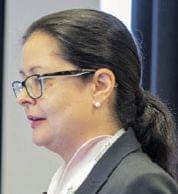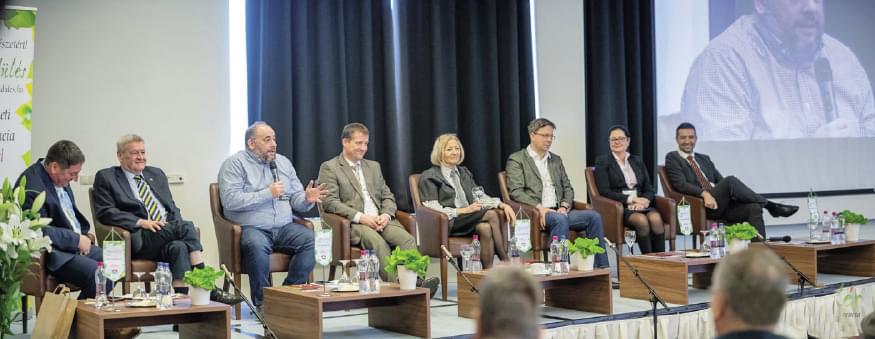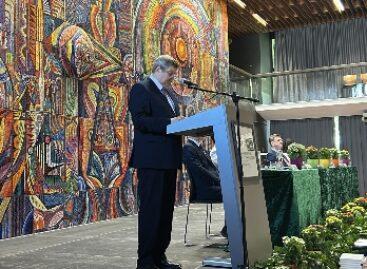Joint efforts will keep them fresh – 7th Zsendülés Horticulture Conference, Szeged
On 10 March Kert-Ész Club Hungary Association organised the annual spring Zsendülés conference in Szeged. The event’s media partner was Trade magazine. József Rácz, president of the association welcomed participants, and after his keynote speech those present started discussing the sector’s place in the national economy, and its macroeconomic significance.
Macro environment and vision for the future

Dr. Zsolt Feldman
state secretary of agriculture
Ministry of Agriculture
Dr Zsolt Feldman, state secretary of agriculture of the Ministry of Agriculture spoke about the recent development policy issues in connection with the fruit-vegetable supply chain. Between 2014 and 2020 the government funded more than 4,000 projects from a budget of HUF 61bn. At the end of 2020 another HUF 1,500bn was earmarked for regional development.

Dr. Anikó Juhász
deputy state secretary
of agriculture
Ministry of Agriculture
On 1 January 2023 a new period will start in the European Union’s Common Agricultural Policy (CAP). Dr Anikó Juhász, deputy state secretary of agriculture of the Ministry of Agriculture talked about this, and the pillars of the related strategic plan Hungary had submitted. CAP’s comprehensive objectives are knowledge transfer, innovation and digitalisation.

Éva Palócz PhD
managing director
Kopint-Tárki
Éva Palócz PhD, CEO of Kopint-Tárki Zrt. gave an overview of the Hungarian economy’s situation in early 2022. She spoke about the growing production costs, for instance fertiliser prices surged 55% at the end of 2021 and energy prices also elevated a lot. Conditions won’t improve this year either, as the workforce shortage will entail higher salaries, and the war in Ukraine will have a negative effect on the economic environment.
Greening: postponed?
For the first roundtable discussion Dr Dávid Mezei, managing director of Takarékbank Agriculture Centre, Dr Ferenc Apáti, president of FruitVeB Interprofessional Organisation for Fruit and Vegetable, Gergely Papp, deputy director general of the Hungarian Chamber of Agriculture (NAK) and Dr Béla Mártonffy, president of NAK’s National Horticulture and Supplier Department joined the speakers. It was mentioned that the result of the greening can be smaller agri-food output in the European Union, and this can lead to a serious crisis all over the world, especially at the time of war; even more so that the two fighting countries don’t produce and export in the present situation.

How can we battle rising prices?

Tamás Hiezl
managing director
CEZ Magyarország
Tamás Hiezl, managing director of CEZ Magyarország Kft. was the next speaker, who revealed that electricity prices started rising already in the second half of 2021. Gas storage facilities had less gas than necessary when demand started to grow at the end of the pandemic. Then the Ukraine-Russia war only made things worse.

Sándor Baja
managing director
Randstad
Sándor Baja, managing director of Randstad Hungary Kft. tried to answer the question whether machines will take the work of humans. One third of the world’s population thinks so, but only 23% of Hungarians are of this opinion. The managing director reckons that Hungarian workers are rather passive, but at least they are open: employers have to go and find them, but then they will take the offer and work for the given company.

Sándor Nagypéter
president-managing director
Association of Horticulturists in the Southern Great Plain
Sándor Nagypéter, president and managing director of the Association of Horticulturists in the Southern Great Plain underlined: production costs are likely to be high for quite a while in the short term, while the retail margin is unlikely to become lower. Unfortunately the sector would need the latter badly if retail chains want to put high quality, fresh Hungarian fruit and vegetables on the shelves.
Paying attention to farmers and consumers
In the second roundtable discussion the participants were the speakers, plus Márton Bittsánszky, deputy head of the Winemaking and Horticulture Department of the Ministry of Agriculture, István Ecsedi, head of department at National Food Chain Safety Office (NÉBIH), Attila Simon, MKB Bank’s director of agriculture business unit and János Nemes-Nagy, member of Kert-Ész Club Hungary Association. Participants talked about how efficient production and the right quantity and quality of produce can be the foundations of market success. Producers’ Sales Organisations (TÉSZ) have realised this and they know pay more attention to farmers.

What is important for shoppers?

Tünde Turcsán
FMCG director
GfK
Next Tünde Turcsán, GfK’s FMCG director analysed fruit and vegetable retail and consumption trends in Hungary (see separate article).

Gábor Patus
strategic purchaser
Auchan Magyarország
Gábor Patus, strategic purchaser of Auchan Magyarország (fruit and vegetables) told: quality has remained important for consumers and prices have started to matter again. Since the Covid-19 pandemic international fruit and vegetable competition has become fiercer.
Dr Gedeon Totth, head of the Marketing Department at the Budapest Business School (BGE) expressed his view that branding is necessary in the fruit-vegetable product category too, as the offering is fragmented and shoppers are looking for identifiable brands, those that deliver value. Not only the big producers should do this, as there is also potential in building local brands.
In the last roundtable discussion of the conference the speakers were joined by the following experts: Gergely Kóra, fruit-vegetable assortment manager of SPAR Magyarország, Zoltán Ujszászi, senior purchaser (fruit and vegetables) of Tisza-COOP Zrt., András Boros, CEO of Budapest Wholesale Market, Bernát Majtényi, managing director of Garten Kft., András Kálmán, international trade manager of the Association of Horticulturists in the Southern Great Plain and Tamás Feczák, member of Kert-Ész Club Hungary Association. Participants talked about the need for shorter supply chains, so that costs can be reduced, and they discussed how branding can help to make higher product prices accepted.

Openness and self-knowledge

Krisztián Steigervald
researcher
Emocionális Marketing
Krisztián Steigervald, a researcher of Emocionális Marketing Kft. was the last speaker at the conference. He underlined that the different generations must be analysed if we want to understand what we can expect from them as employees. After his analysis communication specialist Szilvia Krizsó had a conversation with the researcher. It was revealed that the older generations find it difficult to identify with the viewpoints of young generations. This is the reason why leaders need to have an open mind and self-knowledge if they want to be successful. //
Related news
Irrigation water resources equivalent to one-third of Lake Balaton are available
Despite the extreme drought and lack of precipitation, we can…
Read more >András Tállai: “There is strong intent and potential for development in the sector”
András Tállai, state secretary of the Ministry of Agriculture talked…
Read more >At the forefront of the domestic food industry for more than half a century
The future of the food industry is shaped by young…
Read more >Related news
Corporate leaders’ commitment to sustainability at record level
According to the latest data from the K&H Sustainability Index,…
Read more >FAO food price index rose slightly in June due to higher prices of meat, dairy products and vegetable oils
The Food and Agriculture Organization of the United Nations (FAO)…
Read more >What can cause the price of a wine to increase tenfold?
There are fewer of them worldwide than the number of…
Read more >






